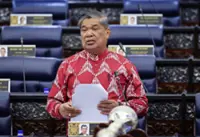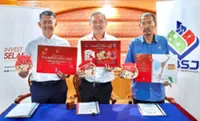Need to move forward: Mohamad Sabu answering a question during the interview at Menara Star, Petaling Jaya. — FAIHAN GHANI/The Star
PETALING JAYA: Malaysia’s rice cultivation technology needs improvement throughout the country, says Agriculture and Food Security Ministry Datuk Seri Mohamad Sabu.
He acknowledged that significant enhancements, particularly in fertilisation, needed to be implemented in the entire place.





